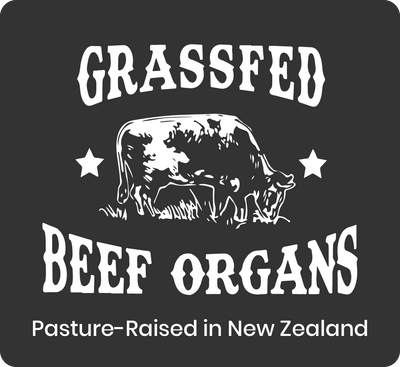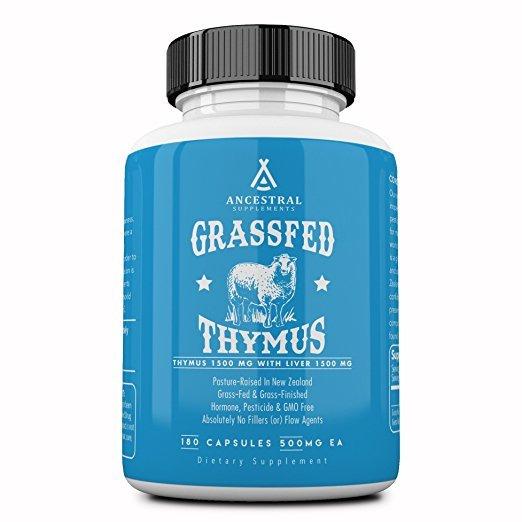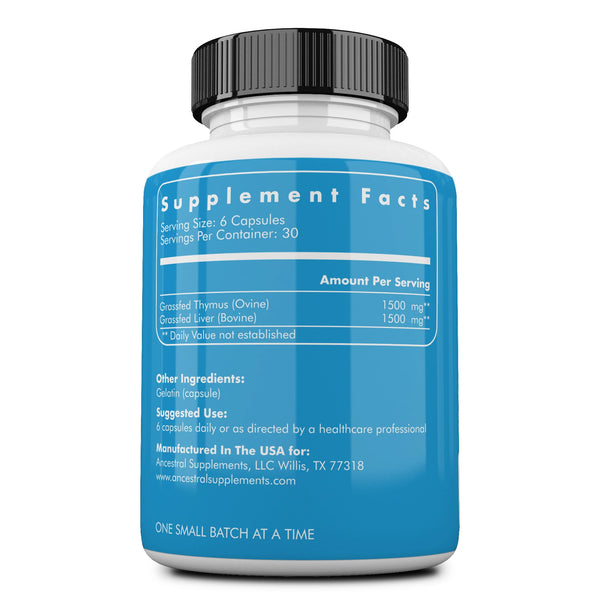Grass fed thymus with liver by Ancestral Supplements
Regular price $129.00
Unit price per
Grass Fed Thymus (Ovine/Bovine)
Freeze-Dried New Zealand Grass fed Thymus with Liver
- Grass Fed Thymus (Ovine/Bovine) 250MG
- Grass Fed Liver (Bovine) 250MG
Other ingredients: Collagen (Beef Gelatin) Capsules
Thymus with Liver contains...
- Proteins Exclusively Found and Expressed in Thymus Tissue
- Unique Peptides Such as Thymosin — Tasked With The Development Of Disease-Fighting T Cells
- Thymopoietin And Serum Thymic Factor to Further Regulate & Support Immune Health
- Immunologically Active Proteins Shown to Stimulate Macrophages & Enhance Natural Killer (NK) Cell Activity
NOTE: The thymus gland shows maximum development immediately after birth. During the aging process, the thymus gland undergoes a process of shrinkage, or involution. The reason for this involution is that the thymus gland is extremely susceptible to free radical and oxidative damage caused by stress, radiation, infection, and chronic illness. The most effective and direct way to stimulate it (and reverse shrinkage) is by consuming undenatured thymus tissue with liver, which is rich in vitamin A, folate, B12, zinc and heme iron.
Thymus with Liver supports...
- Optimal Thymus Health Based On "Like Supports Like"
- Immune System Health
- Allergy Health, Inflammatory Health & Energy Metabolism
NOTE: Vitamin A (from liver) has also been shown to stimulate and/or enhance numerous immune processes. Vitamin A deficiency may predispose an individual to an infection, and during the course of an infection vitamin A stores typically plummet. Vitamin A may be helpful in boosting immune function beyond reversal of vitamin A deficiency, because many immune functions are further enhanced by the administration of (supposedly) excessive levels of vitamin A. In addition, vitamin A prevents and reverses stress-induced thymus gland shrinkage (involution), and additional vitamin A can actually promote thymus growth.
To a very large extent, the health of the thymus determines the health of the immune system. Individuals who get frequent infections or suffer from chronic infections typically have impaired thymus activity. Also, people affected with hay fever, allergies, migraine headaches, or rheumatoid arthritis usually have altered thymus function.
The thymus is responsible for many immune system functions, including the production of T lymphocytes, a type of white blood cell responsible for cell-mediated immunity (immune mechanisms not controlled or mediated by antibodies). Cell-mediated immunity is extremely important in the resistance to infection by mould-like bacteria, yeast (including Candida albicans), fungi, parasites, and viruses (including herpes simplex, Epstein-Barr, and viruses that cause hepatitis). If an individual is suffering from an infection from these organisms, it is a good indication that his or her cell-mediated immunity is not functioning up to par. Cell-mediated immunity is also critical in protecting against the development of autoimmune conditions and allergies.


